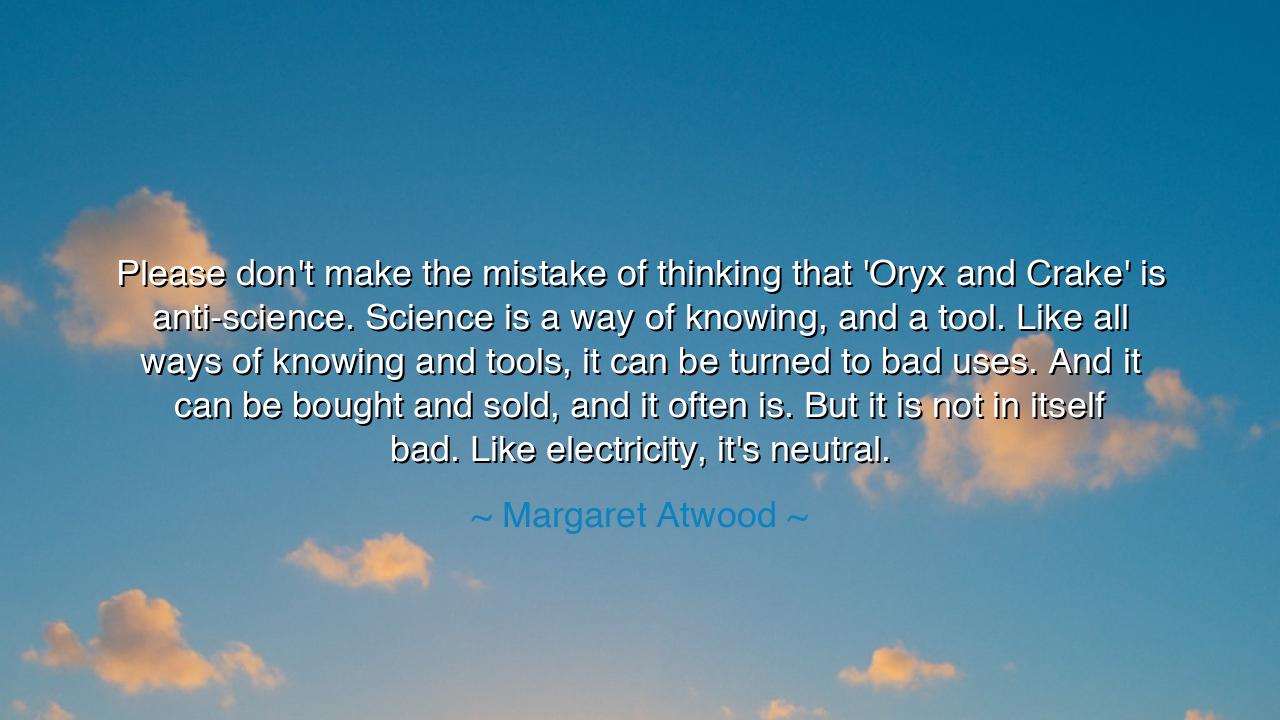
Please don't make the mistake of thinking that 'Oryx and Crake'
Please don't make the mistake of thinking that 'Oryx and Crake' is anti-science. Science is a way of knowing, and a tool. Like all ways of knowing and tools, it can be turned to bad uses. And it can be bought and sold, and it often is. But it is not in itself bad. Like electricity, it's neutral.






"Please don't make the mistake of thinking that 'Oryx and Crake' is anti-science. Science is a way of knowing, and a tool. Like all ways of knowing and tools, it can be turned to bad uses. And it can be bought and sold, and it often is. But it is not in itself bad. Like electricity, it's neutral." These words from Margaret Atwood speak to a profound and timeless truth—that science, like all tools created by mankind, is neither inherently good nor bad. It is, at its core, a way of knowing, a method through which we come to understand the world around us. But as with all tools, the power lies not in the tool itself, but in how it is wielded. In Atwood’s Oryx and Crake, science is not condemned for its ability to advance human understanding; rather, it is shown in the context of human greed and corruption, reminding us that it is not the pursuit of knowledge that is dangerous, but the intentions behind its use.
In ancient times, the Greek philosophers recognized the power of knowledge and reason. They saw science—or rather, the pursuit of understanding the world—as a path toward greater wisdom and truth. Aristotle, for example, sought to understand the natural world not out of a desire to control or manipulate it, but to uncover its deepest principles and to live in harmony with it. But the power of knowledge, even in ancient times, was understood to be a double-edged sword. Knowledge, once acquired, could be used for both good and ill. Socrates warned of those who might use knowledge to deceive or to wield power unjustly. So too, Atwood warns us that science, though neutral in its essence, can be corrupted by those who seek to profit from it without regard for the greater good.
Consider the story of Prometheus, the Titan who brought fire to humanity. Fire, like science, was a powerful tool—able to provide warmth, light, and the means for countless human achievements. But when Prometheus gave fire to mankind, it was both a gift and a curse. With fire, humans could create civilizations, but they could also destroy them. The lesson here is clear: the tool itself was not evil, but the ways in which it was used could lead to both creation and destruction. Fire was neutral, but it was in the hands of humans that its fate was determined. So too is science—it is neither inherently good nor bad, but what we choose to do with it shapes its impact on the world.
In our own time, atomic energy serves as another example of science’s neutrality. The discovery of the atom and the ability to harness its power could have been a force for tremendous good, offering endless clean energy to power the world. Yet, as we know, it was used in the creation of nuclear weapons, devastating cities and altering the course of history. The atom, in and of itself, was not evil, but how we chose to wield its power led to great destruction. Oryx and Crake warns us that science, when manipulated by those with selfish or destructive motives, can lead to catastrophe. But it also holds the potential for advancement, for healing, and for understanding if used with wisdom and compassion.
Atwood’s words remind us that we must not allow ourselves to fall into the trap of viewing science as inherently dangerous or evil. It is not the pursuit of knowledge or discovery that leads to ruin, but the misuse of the tools we create. Technology, in its essence, is neutral—it is the intentions behind its use that give it meaning. The invention of the internet brought forth a vast array of knowledge, a new era of connection and communication. But in the wrong hands, it can also be used to deceive, to control, and to manipulate. The lesson here is that progress itself is not the enemy; it is how we choose to direct that progress, how we choose to use our newfound understanding of the world, that determines whether it leads to enlightenment or destruction.
In our own lives, we must approach the pursuit of knowledge and technology with caution and humility. Let us use science as a tool to uplift humanity, to heal the sick, to cure diseases, to create a more just and compassionate world. But let us also be aware of the dangers that come with unchecked power. Like electricity, science can light the world or burn it down. It is our responsibility to wield it wisely, to ensure that our discoveries are used for the greater good, and to hold ourselves accountable for the ways in which we use the tools we have created.
Therefore, dear ones, take Atwood’s words to heart. Do not fear science, for it is not the source of all our troubles. It is the use of science, driven by human greed, ignorance, or malice, that can lead to disaster. Let us be guided not by fear, but by wisdom, as we navigate the vast landscape of knowledge. May we use the tools we have created not to dominate, but to serve the greater good, to build rather than destroy, and to always remember that the true power lies not in the tool, but in the hands of those who wield it.






AAdministratorAdministrator
Welcome, honored guests. Please leave a comment, we will respond soon